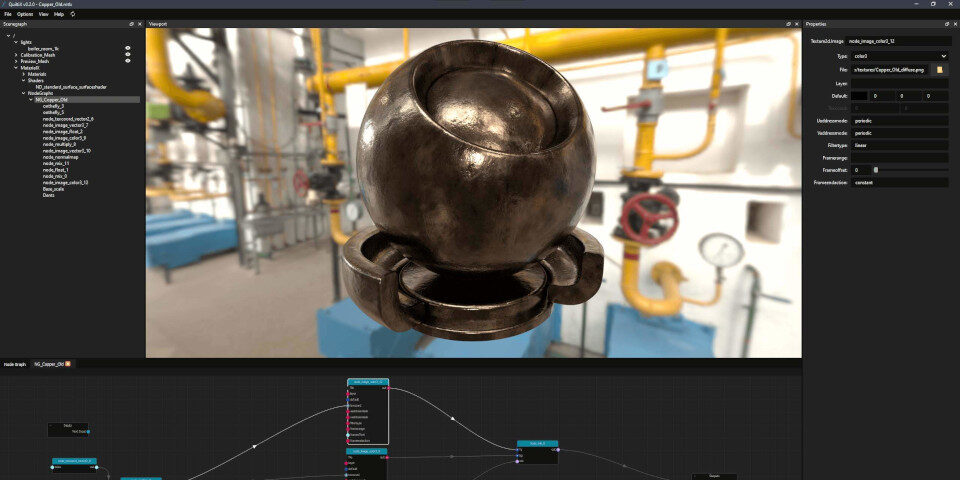QuiltiX: a new open-source MaterialX material editor

Richard Frangenberg and Remedy Entertainment technical artist Manuel Köster have released QuiltiX, a free node-based editor for MaterialX materials.
It enables artists to create or edit materials in MaterialX format, preview them real time in the built-in Hydra viewport, and export the finished material for use in compatible renderers like Arnold or Karma.
A free standalone tool for authoring USD-compatible MaterialX materials
QuiltiX is a standalone editor for creating, importing and exporting MaterialX materials.
Workflow in QuiltiX is node-based, with artists able to preview materials on their own imported models, viewing the results of changes in real time in the viewport.
The software is designed to be artist-friendly, with some nice quality-of-life features: for example, when adding a new node, QuiltiX lists only those nodes that can actually be connected to the input selected.
QuiltiX supports Hydra, the Universal Scene Description’s rendering framework, so any renderer with a Hydra delegate can be used for the viewport preview.
By default, QuiltiX uses HdStorm, the native USD renderer, but there are instructions on GitHub for switching the viewport to use Arnold or Houdini’s Karma renderer.
The software is designed to be used in professional production pipelines, is based around standards like Python and PySide, and is described as highly extensible.
QuiltiX also integrates with Prism, Richard Frangenberg’s open-source VFX pipeline, version 2.0 of which has just been released in open beta, although it can be used without it.
The presentation on QuiltiX and Prism from FMX 2023. The section on QuiltiX starts at 30:10.
Which renderers support MaterialX?
Developed by Industrial Light & Magic as a way to transfer material and look dev data between tools in VFX pipelines, MaterialX is now an open-source project maintained by the Academy Software Foundation.
It is increasingly being adopted in production, particularly as part of pipelines based around the Universal Scene Description (OpenUSD) format, and is supported in CG applications including Maya and Houdini.
MaterialX materials should display near-identically in renderers that support the standard, like Arnold, Karma, RenderMan and Unreal Engine. The format is supported in Blender via AMD’s USD Hydra plugin.
System requirements and licence
QuiltiX is free. Compiled binaries are available for Windows only on the product website.
The source code is available under an open-source Apache 2.0 licence, and can also be compiled for Linux and macOS. You can find instructions for compiling it on GitHub.
Read more about QuiltiX on the product website
(Includes a download link for the Windows edition)
